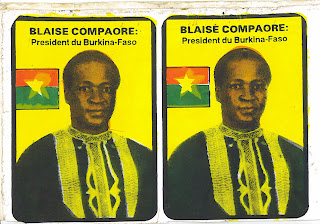
Burkina Faso, or at least the capital Ouagadougou, is commemorating the 20th anniversary of power for president Blaise Compaore. Certain constituencies of the country are also marking the 20th anniversary of the assassination of Tomas Sankara, the fiery leader who came to power through a coup (instigated by Compaore) in 1983.
Pro Blaise or not
You can argue only two sides of the political spectrum exist in today's Burkina Faso: Pro Blaise and Pro Sankara. (Although Blaise has been at pains to instill the idea he’s merely continuing Sankara’s revolution and some do buy into that idea.) Anyway, each faction spent the past few months preparing for the celebration/remembrance. The animosity rose to a new level when Mariam Sankara, Tomas’s widow, announced she would end twenty years of exile and return to Ouagadougou for a celebration of her late husband’s life. (She’s currently suing the Burkinabé government for its role in the death of her husband.)

Remembering and forgetting
This is the subtext the 20th anniversary/remembrance: How much Burkina Faso – the name Sankara gave to the country – has changed since his assassination. No matter what we think of Sankara, we live in a completely different epoch, said Halidou Ouedraego, head of the largest human rights association in the country. Sankara came to power in the height of the Cold War, he made a name for himself around Africa by offending both superpowers, worrying publicly about the role debt on African economies and famously kicking out the aid and development organizations, hoping to jump start the country to become self reliant.
Since becoming the president after winning elections thrice, Compaore has practised religiously the true principles of democratic system, allowing for free speech, fairness, justice and non-interference with other arms of government. In order to give credibility to the electoral system, he has put in place a truly independent National Electoral Commission called CENI, a 27-member body which has representatives of the opposition, religious bodies, traditional rulers, trade unions, the civil society and human rights' groups. Every organization has freedom to choose who they prefer to be on the CENI, and because of this unique and unprecedented electoral commission, any result from the commission is never disputed.
“There is no freedom of expression; there are no economic rights…and justice? And the [problem of] impunity? Where are those? You must settle all of that.”
The real meaning
For the international community, this anniversary brings up a few issues. First, it feels odd to celebrate a “president’s” 20th anniversary in power. But in Africa, it’s a common marker. Compaore is currently the 25th longest-serving head of state in the world. El Hadj Omar Bongo in Gabon will celebrate his 40th anniversary in December; Col. Muammar al-Gaddafi will hit forty years of power in 2009, the same year Teodoro Obiang Nguema Mbasogo in Equatorial Guinea and José Eduardo dos Santos in Angola will celebrate the big 30. Zimbabwe will mark 30 years of President Robert Mugabe in 2010. Common entries on Dictator of the Year lists, Honsi Mubarek in Egypt, Paul Biya in Cameroon, and Lansana Conté in Guinea came to power between 1981 and 1984. Finally, Yoweri Museveni beat Compaore and Zine el Abidine Ben Ali of Tunisia to office by a year. Ahmad al-Bashir of Sudan will celebrate 20 years in 2009 and Idriss Déby of Chad in 2010.
Talk from the State Dept. now centers on using the frame of good governance to dictate the amount of funds a country receives: freedom of the press, the fight against corruption, etc. It’s true that more “democratic” countries are often better run , which translates into higher levels of development for citizens. The truth is, however, the U.S. government throws very little money around the continent. It doesn’t really have the leverage to make a country more “democratic” – even if it decides that African democracy is in its real interests.

2 comments:
Great article - much better than my feeble effort!
And great to see someone else blogging from Burkina.
best wishes
by the way, you can find my post here:
http://www.voiceinthedesert.org.uk/keith/archives/2007/10/burkina_faso_20.html
Post a Comment